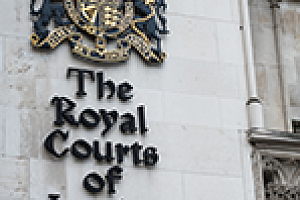Newsletter registration

Don’t refuse to mediate! Engage
Smile for the Camera?
ADHD diagnosis and disability
The coroner's duty to notify the DPP
Racist comments from one employee to another

Court of Protection case update: July 2025
Maximising ROI in renewable energy: Legal, technical, and financial strategies for net-zero success
Personal circumstances, public safety, and the planning balance
The Environment (Principles, Governance and Biodiversity Targets (Wales) Bill: the key provisions
Errors of law, materiality and remedies

What next for rent reviews?
Commonhold reform – the beginning of the end?
The CAT’s approach to Subsidy Decision Reviews: Fast, cheap and simple?
Millbrook Healthcare Limited v Devon County Council – Its impact on local government procurement
Early insights into the English Devolution and Community Empowerment Bill
The section 58 defence in the Highways Act 1980
Risk assessments in care proceedings: L-G and Re T
Turbulence ahead
PFI – a new era?
Costs in discrimination claims brought by litigants in person
The Building Safety Act and retrospective service charge protection
Right to Buy (RTB) leases — be warned about service charges
Awaab’s Law – implementation of Phase 1
Seven key insights: Lord Justice Birss considers AI in civil justice
Imperative requirements in homelessness: nuts and bolts on a bumpy roadmap to suitable accommodation
Neurodiversity in the Family Justice System Panel Discussion
Employment Law Webinar Series - May to July - 42 Bedford Row
Home Truths - Dissecting Section 16J: Criminal Confusion in the Renters’ Rights Bill - 42 Bedford Row
Home Truths: Grounds for Possession under the Renters' Rights Bill - 42 Bedford Row
Airport Subsidy Challenged in the CAT
IPA guidance 2025: Managing PFI distress and preparing for expiry
What might the public inquiry on child sexual exploitation look like
Data (Use and Access) Act – Updating Data Protection Law and more
High Court Dismisses Challenge to New Super Prison
AI, copyright and LLMs
Automatic suspensions and the public interest
FOI and communication
Too much?
Deploying ‘ADR’ in Planning & Compensation contexts
Removal from the village green register
The attendance of experts in family proceedings
Local authority enforcement powers and domestic beekeeping
Too little? When intervention is not required
Closures of educational sites
Public law case update Q1 2025
Must read
Families refusing access to support
Must read
Families refusing access to support
Blowing in the wind
David Hart QC looks at a First-tier Tribunal case involving the Planning Inspectorate that is thought to be the first time in which legal professional privilege has been considered in the context of the Environmental Information Regulations.
The interesting decision of the First-tier Tribunal in Robinson v. Information Commissioner & Department for Communities & Local Government Case EA/2010/020419 (not linked to this article, for reasons I shall explain below) goes to the circumstances in which a public authority can refuse under environmental information rules to disclose legal advice received by it.
All lawyers will know that such advice is covered by legal professional privilege. But such privilege does not necessarily prevent it from being disclosed by a public authority. Under the Freedom of Information Act (FOIA) regime, it is a ground for refusing to produce documents, but only when that is in the public interest. Under the exemptions in the Environmental Information Regulations privilege is not even a ground of exemption; the public authority must show a rather different thing, namely that disclosure of the legal advice would adversely affect the course of justice, and in all the circumstances of the case, the public interest in maintaining that exemption outweighs the public interest in disclosure. In addition, there is a presumption in favour of disclosure.
The appeal arose out of a planning application by a windfarm operator to install an 80m tall anemometer (and associated guy wires radiating over about 0.5ha) near Fring in North Norfolk. Its purpose was to assess the viability of a wind farm at or near the site. It became a matter of local controversy. The local planning authority refused permission, and the operator appealed.
The issue then arose: how should the appeal be decided? There are three ways of doing this – a full public inquiry with oral evidence and submissions, an informal hearing or written representations. Local people (of whom the appellant is one) wanted a public inquiry. They were supported in that by the council, and the local MP thought that the council was the best body to judge that.
The Planning Inspectorate (PINS, an Executive Agency of DCLG, the relevant government department) disagreed with the calls for a public inquiry. Its initial letter from an administrator in August 2009 said that the issues being raised by the objectors were “the same as in the reason for refusal i.e. the impact of the development on visual amenity….In this case the [local] controversy would appear to more specifically directed at the possibility that the anemometer will lead to subsequent applications for wind turbines…. The fact that there may be a subsequent application for wind application for wind turbines is not something the Inspector will be able to attach any weight to in reaching his conclusions on the current application.” In short, PINS said, no complex issues arose for which a public inquiry was necessary.
The appellant was in fact putting a rather more complex case than PINS’s reasons suggest. He and his team were saying that an anemometer would itself have an impact on local populations of pinkfooted geese, a protected species in nearby coastal areas; hence, any development would need an Environmental Impact Assessment before it could be approved by the planning authority, whether or not the wind turbines proceeded.
This, with all due respect to PINS, is by no means a straightforward argument; the threshold of when an EIA is or not needed is far from straightforward, and in any event there are a number of European cases designed to stop developers “salami-slicing” applications into bits which do not require an EIA, whereas the proposal taken as a whole would require an EIA. The issue was not simply about visual amenity, as PINS thought it was; the mast would pose a potential hazard to the geese, and the question before the Inspector was whether this was significant and/or could be mitigated against.
PINS were however unmoved. They confirmed their views in a later letter of December 2009 – in which they said they had “taken legal advice which has confirmed that our approach on this point is correct.”
Unsurprisingly, the appellant asked to see this legal advice. And it was PINS’s refusal to provide it, coupled with the Information Commissioner’s confirmation of that refusal (see ICO site), which led to this appeal.
Before explaining why the Tribunal allowed the appeal, I should complete the rest of the story. The planning appeal proceeded by way of written representations. The operator’s appeal was allowed on the basis that, yes, the mast did present a potential hazard to pink-footed geese, but that there was no evidence that the proposal would result in significant losses of geese, and that in any event this could be mitigated by attaching deflectors apparent to flying birds – even though these would also make the structure equally apparent to local people. (One wonders whether determination of this issue might have been assisted further by the carrying out of the EIA for which the appellant was calling).The Inspector was not persuaded that the anemometer proposal was an integral part of an inevitably more substantial proposal. Hence, on 15 February 2010, the planning appeal was allowed.
There were two other potential routes for the appellant to take in respect of PINS. He could have sought judicial review of PINS’s original decision or he could have appealed or sought judicial review of the Inspector’s decision. However, as he explained in his submissions to the IC and the Tribunal, either route would have cost substantial sums and may have given rise to significant costs liabilities if unsuccessful – precisely the point which has put the UK in trouble with the Aarhus Compliance Committee enforcing that Convention about access to justice, and on which the UK faces infraction proceedings before the European Court of Justice.
Returning now to the Tribunal’s decision, it ordered disclosure of the advice. It concluded that the EIR regime, based upon Directive 2003/4/EC on public access to environmental information, is a more permissive regime that the domestic freedom of information regime. The Tribunal held that it was not consistent with either that Directive or FOIA:
"to carve out what amounts to a de facto absolute exemption for legal advice. Nor is it consistent with the presumption in favour of disclosure expressly articulated in Regulation 12(2) EIR.
69. The information being requested was used by PINS as the basis for depriving the Appellant and members of the public of their ability to participate effectively in environmental decision-making. Considering the information itself, even if this exception was fully engaged (and the Tribunal, in the circumstances of this case, concludes on the balance of probabilities that it is not) then the public interest balancing test could not produce a result which would prevent disclosure."
Hence, even if the exemption relied upon was engaged by the advice in question, "the public interest elements in this case were sufficiently compelling to override the considerations which usually favour withholding legal advice." [74]
This conclusion is both interesting and significant. It may be the first time in which legal professional privilege has been considered in the context of the EIRs, though it has been litigated on various occasions under the freedom of information regime. Whilst of course the principle of legal professional privilege (a right to consult your lawyer and receive his advice freely) is itself an important value to be upheld, it equally must be right that the balancing of public interests must be carried out in the circumstances of each case before disclosure is ordered or refused, as the case may be.
I understand that PINS have sought to appeal this decision to the Upper Tribunal, and have been granted permission to do so. I also understand that the Tribunal refused an application to recall its decision, and remove certain parts of it to a confidential annex before re-issuing it, and that permission has also been granted to appeal that refusal. I have not therefore linked the decision to this post – for a similar reason, the decision is not to be found on the Tribunal website.
Finally, a declaration of interests, of sorts. I live not far from the appeals site, beneath the daily flight path of the many thousands of pink-footed geese which over-winter in North Norfolk. I am also grateful for the appellant drawing my attention to this decision.
David Hart QC is a barrister at 1 Crown Office Row. This article first appeared on the set's human rights blog.
- Details
David Hart QC looks at a First-tier Tribunal case involving the Planning Inspectorate that is thought to be the first time in which legal professional privilege has been considered in the context of the Environmental Information Regulations.
The interesting decision of the First-tier Tribunal in Robinson v. Information Commissioner & Department for Communities & Local Government Case EA/2010/020419 (not linked to this article, for reasons I shall explain below) goes to the circumstances in which a public authority can refuse under environmental information rules to disclose legal advice received by it.
All lawyers will know that such advice is covered by legal professional privilege. But such privilege does not necessarily prevent it from being disclosed by a public authority. Under the Freedom of Information Act (FOIA) regime, it is a ground for refusing to produce documents, but only when that is in the public interest. Under the exemptions in the Environmental Information Regulations privilege is not even a ground of exemption; the public authority must show a rather different thing, namely that disclosure of the legal advice would adversely affect the course of justice, and in all the circumstances of the case, the public interest in maintaining that exemption outweighs the public interest in disclosure. In addition, there is a presumption in favour of disclosure.
The appeal arose out of a planning application by a windfarm operator to install an 80m tall anemometer (and associated guy wires radiating over about 0.5ha) near Fring in North Norfolk. Its purpose was to assess the viability of a wind farm at or near the site. It became a matter of local controversy. The local planning authority refused permission, and the operator appealed.
The issue then arose: how should the appeal be decided? There are three ways of doing this – a full public inquiry with oral evidence and submissions, an informal hearing or written representations. Local people (of whom the appellant is one) wanted a public inquiry. They were supported in that by the council, and the local MP thought that the council was the best body to judge that.
The Planning Inspectorate (PINS, an Executive Agency of DCLG, the relevant government department) disagreed with the calls for a public inquiry. Its initial letter from an administrator in August 2009 said that the issues being raised by the objectors were “the same as in the reason for refusal i.e. the impact of the development on visual amenity….In this case the [local] controversy would appear to more specifically directed at the possibility that the anemometer will lead to subsequent applications for wind turbines…. The fact that there may be a subsequent application for wind application for wind turbines is not something the Inspector will be able to attach any weight to in reaching his conclusions on the current application.” In short, PINS said, no complex issues arose for which a public inquiry was necessary.
The appellant was in fact putting a rather more complex case than PINS’s reasons suggest. He and his team were saying that an anemometer would itself have an impact on local populations of pinkfooted geese, a protected species in nearby coastal areas; hence, any development would need an Environmental Impact Assessment before it could be approved by the planning authority, whether or not the wind turbines proceeded.
This, with all due respect to PINS, is by no means a straightforward argument; the threshold of when an EIA is or not needed is far from straightforward, and in any event there are a number of European cases designed to stop developers “salami-slicing” applications into bits which do not require an EIA, whereas the proposal taken as a whole would require an EIA. The issue was not simply about visual amenity, as PINS thought it was; the mast would pose a potential hazard to the geese, and the question before the Inspector was whether this was significant and/or could be mitigated against.
PINS were however unmoved. They confirmed their views in a later letter of December 2009 – in which they said they had “taken legal advice which has confirmed that our approach on this point is correct.”
Unsurprisingly, the appellant asked to see this legal advice. And it was PINS’s refusal to provide it, coupled with the Information Commissioner’s confirmation of that refusal (see ICO site), which led to this appeal.
Before explaining why the Tribunal allowed the appeal, I should complete the rest of the story. The planning appeal proceeded by way of written representations. The operator’s appeal was allowed on the basis that, yes, the mast did present a potential hazard to pink-footed geese, but that there was no evidence that the proposal would result in significant losses of geese, and that in any event this could be mitigated by attaching deflectors apparent to flying birds – even though these would also make the structure equally apparent to local people. (One wonders whether determination of this issue might have been assisted further by the carrying out of the EIA for which the appellant was calling).The Inspector was not persuaded that the anemometer proposal was an integral part of an inevitably more substantial proposal. Hence, on 15 February 2010, the planning appeal was allowed.
There were two other potential routes for the appellant to take in respect of PINS. He could have sought judicial review of PINS’s original decision or he could have appealed or sought judicial review of the Inspector’s decision. However, as he explained in his submissions to the IC and the Tribunal, either route would have cost substantial sums and may have given rise to significant costs liabilities if unsuccessful – precisely the point which has put the UK in trouble with the Aarhus Compliance Committee enforcing that Convention about access to justice, and on which the UK faces infraction proceedings before the European Court of Justice.
Returning now to the Tribunal’s decision, it ordered disclosure of the advice. It concluded that the EIR regime, based upon Directive 2003/4/EC on public access to environmental information, is a more permissive regime that the domestic freedom of information regime. The Tribunal held that it was not consistent with either that Directive or FOIA:
"to carve out what amounts to a de facto absolute exemption for legal advice. Nor is it consistent with the presumption in favour of disclosure expressly articulated in Regulation 12(2) EIR.
69. The information being requested was used by PINS as the basis for depriving the Appellant and members of the public of their ability to participate effectively in environmental decision-making. Considering the information itself, even if this exception was fully engaged (and the Tribunal, in the circumstances of this case, concludes on the balance of probabilities that it is not) then the public interest balancing test could not produce a result which would prevent disclosure."
Hence, even if the exemption relied upon was engaged by the advice in question, "the public interest elements in this case were sufficiently compelling to override the considerations which usually favour withholding legal advice." [74]
This conclusion is both interesting and significant. It may be the first time in which legal professional privilege has been considered in the context of the EIRs, though it has been litigated on various occasions under the freedom of information regime. Whilst of course the principle of legal professional privilege (a right to consult your lawyer and receive his advice freely) is itself an important value to be upheld, it equally must be right that the balancing of public interests must be carried out in the circumstances of each case before disclosure is ordered or refused, as the case may be.
I understand that PINS have sought to appeal this decision to the Upper Tribunal, and have been granted permission to do so. I also understand that the Tribunal refused an application to recall its decision, and remove certain parts of it to a confidential annex before re-issuing it, and that permission has also been granted to appeal that refusal. I have not therefore linked the decision to this post – for a similar reason, the decision is not to be found on the Tribunal website.
Finally, a declaration of interests, of sorts. I live not far from the appeals site, beneath the daily flight path of the many thousands of pink-footed geese which over-winter in North Norfolk. I am also grateful for the appellant drawing my attention to this decision.
David Hart QC is a barrister at 1 Crown Office Row. This article first appeared on the set's human rights blog.
Senior Lawyer - Advocate
Head of Governance & University Solicitor
Head of Legal Shared Service
Director of Legal and Governance (Monitoring Officer)
Locums
Poll
20-08-2025 10:00 am
15-09-2025 10:00 am
08-10-2025 10:00 am
22-10-2025 4:00 pm
05-11-2025 4:00 pm








































